|
|
|
Sort Order |
|
|
|
Items / Page
|
|
|
|
|
|
|
| Srl | Item |
| 1 |
ID:
111690
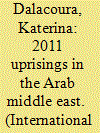

|
|
|
|
|
| Publication |
2012.
|
| Summary/Abstract |
The Arab uprisings of 2011 are still unfolding, but we can already discern patterns of their effects on the Middle East region. This article offers a brief chronology of events, highlighting their inter-connections but also their very diverse origins, trajectories and outcomes. It discusses the economic and political grievances at the root of the uprisings and assesses the degree to which widespread popular mobilization can be attributed to pre-existing political, labour and civil society activism, and social media. It argues that the uprisings' success in overthrowing incumbent regimes depended on the latter's responses and relationships with the army and security services. The rebellions' inclusiveness or lack thereof was also a crucial factor. The article discusses the prospects of democracy in the Arab world following the 2011 events and finds that they are very mixed: while Tunisia, at one end, is on track to achieve positive political reform, Syria, Yemen and Libya are experiencing profound internal division and conflict. In Bahrain the uprising was repressed. In Egypt, which epitomizes many regional trends, change will be limited but, for that reason, possibly more long-lasting. Islamist movements did not lead the uprisings but will benefit from them politically even though, in the long run, political participation may lead to their decline. Finally, the article sketches the varied and ongoing geopolitical implications of the uprisings for Turkish, Iranian and Israeli interests and policies. It assesses Barack Obama's response to the 2011 events and suggests that, despite their profound significance for the politics of the region, they may not alter the main contours of US foreign policy in the Middle East in a major way.
|
|
|
|
|
|
|
|
|
|
|
|
|
|
|
|
| 2 |
ID:
106380
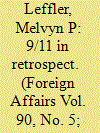

|
|
|
| 3 |
ID:
130331
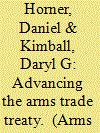

|
|
|
|
|
| Publication |
2014.
|
| Summary/Abstract |
Thomas Countryman took office as assistant secretary of state for international security and nonproliferation on September 27, 2011. He joined the U.S. Foreign Service in 1982. He was lead negotiator for the United States in the talks that produced the Arms Trade Treaty (ATT) last year. Arms Control Today spoke with Countryman in his office on March 12. Countryman was joined by William Malzahn, senior coordinator in the Office of Conventional Arms Threat Reduction. In the interview, Countryman explained the reasons that the United States signed the ATT, addressed domestic criticism of the pact, and looked ahead to the challenges that the treaty faces.
|
|
|
|
|
|
|
|
|
|
|
|
|
|
|
|
| 4 |
ID:
099794
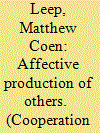

|
|
|
|
|
| Publication |
2010.
|
| Summary/Abstract |
IR scholars have recently turned to emotions to understand and explain events in world politics. Although this turn is appealing, most scholars have failed to critically examine the relationships between emotion, language, identity and foreign policy. This article aims to unpack these relationships. Drawing upon Sara Ahmed's notion of the 'emotionality of texts', this article explores how foreign policy may be an affective practice, which can be defined as a ritualized practice of discursively binding emotions to Others' identities and legitimating foreign policy through a discursive logic of feeling. In this way, identities are produced and policies are legitimated affectively. Neglecting the emotional narratives that constitute Self/Other relations leads to an insufficient understanding of emotion in global politics, an incomplete understanding of how identities emerge and matter as they do, and forecloses new alternatives of apprehending transformative ruptures and enduring patterns of Self/Other interaction. Through an analysis of United States policy towards the Israeli-Palestinian conflict, this article highlights the importance of emotion and affective practices in world politics.
|
|
|
|
|
|
|
|
|
|
|
|
|
|
|
|
| 5 |
ID:
185670


|
|
|
|
|
| Summary/Abstract |
The African Continental Free Trade Agreement, launched on January 1, 2021, will be Africa’s most ambitious united endeavor to assert financial oversight over the extractive resources sector—if it is fully implemented. The United States can act as a supportive partner, but what matters most is change from within Africa itself to finally realize pan-African visions of economic sovereignty.
|
|
|
|
|
|
|
|
|
|
|
|
|
|
|
|
| 6 |
ID:
126004
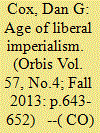

|
|
|
|
|
| Publication |
2013.
|
| Summary/Abstract |
The most common assertion about U.S. foreign policy appearing in scholarly journals and opinion articles is that it is incoherent. This article will show that nothing could be further from the truth. In fact, it is a growing cohesiveness from political science centered around the democratic peace thesis and a growing interdisciplinary consensus that western human rights need to be granted and enforced around that world that has fed into a highly cohesive, highly militarized, foreign policy of what will be defined as Liberal Imperialism.
|
|
|
|
|
|
|
|
|
|
|
|
|
|
|
|
| 7 |
ID:
113758
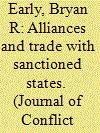

|
|
|
|
|
| Publication |
2012.
|
| Summary/Abstract |
What determines how US economic sanctions affect the international trade conducted with their targets? This article develops a liberal-based explanation for why economic sanctions increase their targets' trade with some third parties and decrease it with others. It is theorized that the effects of defense pact alliances between sender and third-party states are conditional upon the strength of the third parties' commercial dependence upon the target states. Third parties will cooperate with senders when the costs are low, but use their alliance relationships as cover to sanctions bust when the commercial benefits are high. This suggests that the United States can best gain the support of allies whose cooperation matters the least, while the allies whose support is most important tend to sanctions bust. It is also theorized that a target state's allies trade more with it than its nonallies. An empirical analysis of ninety-six episodes of US-imposed sanctions supports these hypotheses.
|
|
|
|
|
|
|
|
|
|
|
|
|
|
|
|
| 8 |
ID:
164373
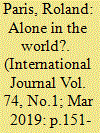

|
|
|
|
|
| Summary/Abstract |
Canada has found itself in serious diplomatic disputes over the past year with Saudi Arabia and China. The Saudis took issue with the Canadian foreign minister’s call to release human rights activists from prison, whereas China was angry at Canada’s arrest of a senior Chinese executive on an extradition request from the United States. These incidents should not be viewed as isolated aberrations. Authoritarian regimes seem increasingly emboldened to lash out at countries that displease them, including allies of the United States. But Ottawa has succeeded in rallying considerable international support for its position in the China dispute, suggesting that while Canada may be exposed, it is not destined to be alone
|
|
|
|
|
|
|
|
|
|
|
|
|
|
|
|
| 9 |
ID:
170043
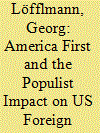

|
|
|
|
|
| Summary/Abstract |
Trump's foreign policy does not spell the end of the liberal international order but does challenge the notion that liberal hegemony lacks a legitimate alternative.
|
|
|
|
|
|
|
|
|
|
|
|
|
|
|
|
| 10 |
ID:
130871
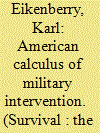

|
|
|
|
|
| Publication |
2014.
|
| Summary/Abstract |
The protracted campaigns in Afghanistan and Iraq have diminished America's appetite for waging wars to end tyranny or internal disorder in foreign lands. Military interventions have traditionally been a source of controversy in the United States. But America's appetite for the dispatch of armed forces has been diminished greatly by factors that have primarily emerged in the twenty-first century. These include, most painfully, the protracted campaigns in Afghanistan and Iraq that have made US political and military leaders more cautious about waging wars to end tyranny or internal disorder in foreign lands.
|
|
|
|
|
|
|
|
|
|
|
|
|
|
|
|
| 11 |
ID:
155790
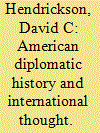

|
|
|
|
|
| Summary/Abstract |
This essay offers a constitutional perspective on the American encounter with the problem of international order. Its point of departure is the American Founding, a subject often invisible in both the history of international thought and contemporary International Relations theory. Although usually considered as an incident within the domestic politics of the United States, the Founding displays many key ideas that have subsequently played a vital role in both international political thought and IR theory. The purpose of this essay is to explore these ideas and to take account of their passage through time, up to and including the present day. Those ideas shine a light not only on how we organize our scholarly enterprises but also on the contemporary direction of US foreign policy and the larger question of world order.
|
|
|
|
|
|
|
|
|
|
|
|
|
|
|
|
| 12 |
ID:
114966
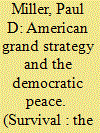

|
|
|
|
|
| Publication |
2012.
|
| Summary/Abstract |
It is commonplace to lament the United States' lack of a coherent grand strategy. Cold War historian John Lewis Gaddis argued in 2009 that the United States suffered from a 'grand strategic deficit' that went back two decades to the fall of the Soviet Union. Stephen Walt, a prominent International Relations professor at Harvard, blogged in 2010 that 'the United States tries to do more than it should, finds it much harder to set clear priorities, and tends to miss opportunities to "pass the buck" to others', the solution for which was 'a more lively public debate on fundamental issues of grand strategy'. Fareed Zakaria, then editor of Newsweek International, wrote in 2008 an article titled simply: 'Wanted: A New US Grand Strategy'.
|
|
|
|
|
|
|
|
|
|
|
|
|
|
|
|
| 13 |
ID:
169216
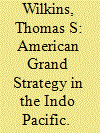

|
|
|
|
|
| Summary/Abstract |
In an era of heightened great power competition, debates about American grand strategy in the Indo-Pacific region have returned to the fore. This review essay looks at three recent volumes that directly address such debates. After introducing the concept of grand strategy, Part I reviews each of the books individually in sequence, outlining their scope, contents, and contributions. Part II then integrates the contribution of each of the volumes into a broader discussion relating to four pertinent issues: American perspectives on “Asia”; international relations (IR) theory; American strategic culture; and the rise of China, before concluding. The books under review are to differing degrees orientated toward one of the core IR theory paradigms: realism (Green), liberalism (Campbell), and constructivism/critical (Kang) approaches. As such, read together, they contribute to a multi-faceted theoretical understanding of US grand strategy in the Indo Pacific that will be of significant value to both scholars and practitioners.
|
|
|
|
|
|
|
|
|
|
|
|
|
|
|
|
| 14 |
ID:
130239
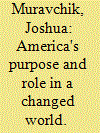

|
|
|
|
|
| Publication |
2014.
|
| Summary/Abstract |
Almost every war that America has fought since the beginning of the twentieth century was a war America had determined to avoid. We were neutral in World War I?.?.?.?until unlimited submarine warfare against our trans-Atlantic shipping became intolerable. We resisted entering World War II until Pearl Harbor. We defined the Korean peninsula as lying outside our "defense perimeter," as our secretary of state declared in 1950, a few months before North Korea attacked South Korea and we leapt into the fray. A few years later, we rebuffed French appeals for support in Vietnam in order to avoid involving ourselves in that distant country which was soon to become the venue of our longest war and greatest defeat. In 1990, our ambassador to Iraq explained to Saddam Hussein that Washington had "no opinion on?.?.?.?your border disagreement with Kuwait," which he took as encouragement to swallow his small neighbor, forcing a half million Americans to travel around the world to force him to disgorge it. A year after that, our secretary of state quipped about the violent disintegration of Yugoslavia that "we have no dog in that fight," a sentiment echoed by his successor, of the opposite party, who, demonstrating his virtuosity at geography, observed that that country was "a long way from home" in a place where we lacked "vital interests"-all this not long before we sent our air force to bomb Serbia into ceasing its attacks on Bosnia and then bombed it again a few years later until it coughed up Kosovo.
|
|
|
|
|
|
|
|
|
|
|
|
|
|
|
|
| 15 |
ID:
130243
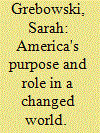

|
|
|
|
|
| Publication |
2014.
|
| Summary/Abstract |
I'll never forget my brief and ill-received show of American patriotism as a young expatriate in Beirut. It was the summer of 2010, and the city was teeming with convoys of Lebanese youth honking and waving flags to celebrate their favorite teams' victories in the World Cup. After an exciting win by the US, I joined a group of Americans in a street celebration. But cruising down the main thoroughfare of West Beirut, our procession of stars and stripes was met with disapproving looks. The image that remains with me to this day is that of an older man standing silently with his shoe in his hand. The tattered sole was pointed directly at us, an expression of disrespect in Muslim culture. We recognized the gesture's meaning only because a similar shoe had been thrown at the American president's head a year earlier.
Today's generation of young Americans, known as the millennials, has come of age at a time when America has been humbled on the world stage. Many of them have traveled extensively at a young age and experienced this diminished reputation firsthand. Their parents and grandparents believe that America has been a remarkable force for good in the world and that the country should not lose sight of its responsibility to shape events globally because of mistakes made in the last decade. But millennials seem more fixed on the limits of American power and disenchanted with ideas of American exceptionalism.
Because of these reservations, the millennial generation is often described as declinist or isolationist. I disagree. Young Americans care more than any other age group about what happens beyond our borders. Millennials tend toward multilateralism and the cautious use of force, and perhaps would be more selective in committing US resources overseas. But far from an abdication of global leadership, this prudence may prove to be the silver lining to millennials' crisis of confidence in America's role as, in President Obama's words, "not just a place on a map, but the light to the world."
|
|
|
|
|
|
|
|
|
|
|
|
|
|
|
|
| 16 |
ID:
130843
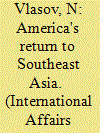

|
|
|
|
|
| Publication |
2014.
|
| Summary/Abstract |
The article examines U.S. foreign relations with Southeast Asia. An increase in U.S. involvement in the region under the administration of President Barack Obama is considered. A contradiction in U.S. policy is said to exist between insistence by the administration that its desire for stability and freedom of the seas in Southeast Asia is not intended as containment of China and China's aggressive maritime boundary claims in the South China Sea.
|
|
|
|
|
|
|
|
|
|
|
|
|
|
|
|
| 17 |
ID:
099889
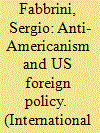

|
|
|
|
|
| Publication |
2010.
|
| Summary/Abstract |
From the end of the Cold War in 1991 to the end of the 2000s, anti-Americanism has passed through different phases in Europe, as well as in other parts of the world: it was modest in the 1990s, it exploded between 2003-2008, then declined after 2008. Although anti-Americanism continues to be rooted in many political cultures and experiences, its emergence in the post Cold War era seemed to be correlated to a United States foreign policy-making process unrestrained by either domestic or international institutions. When domestic and international multilateral checks have been unable to keep under control the exercise of US international power, then anti-Americanism has functioned as a sort of last resort critic on the latter. Anti-Americanism has seemed to be the reaction, more than to controversial foreign policy's decisions, to their unchecked elaboration and unilateral implementation. For world public opinion, the legitimacy of the foreign policy-making process counts more than the latter's outcomes.
|
|
|
|
|
|
|
|
|
|
|
|
|
|
|
|
| 18 |
ID:
196200


|
|
|
|
|
| Summary/Abstract |
In challenging normal patterns of foreign policy legitimation and undermining the internationalist consensus in favour of liberal hegemony, Donald Trump's populism constituted a political trauma for the foreign policy establishment (FPE) of the United States. How did the FPE respond? Based on a discursive approach and using the methodology of qualitative frame analysis, we examine the anti-populist response to the Trump trauma on the part of the FPE. The findings show how the FPE framed Trumpian populism as a political anomaly through interlocking frames of authoritarianism, irresponsibility and immaturity. This could only be rectified through a process of foreign policy normalization, carried through the first two years of the Joe Biden administration, which aimed to stabilize US leadership and restore the consensus that existed prior to the populist disruption. Highlighting the emotional dimensions of anti-populism, the article contends that to fully understand the effects of global populism, we must examine elite responses to populist ‘ruptures’ of the kind Trump represented. By extending the concept of anti-populism to debates on foreign policy, the article addresses existing gaps in the literatures on anti-populism and the effects of populist foreign policy.
|
|
|
|
|
|
|
|
|
|
|
|
|
|
|
|
| 19 |
ID:
154664
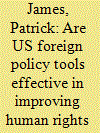

|
|
|
|
|
| Summary/Abstract |
This is the first empirical study to evaluate, in combination, the relative impact of the US’s four major foreign policy tools (i.e., military intervention, military assistance, economic sanctions, and economic assistance) on human rights conditions abroad. This study presents a Hegemonic Intervention Hypothesis, which cautions against US action to promote human rights, and a Coercion Hypothesis, which assesses punitive actions as likely to be more harmful than acts of assistance. Relying on a dataset of 144 countries for the years 1975–2005, this study finds that, contrary to Washington’s stated desire to promote human rights, all forms of US foreign policy intervention are either neutral in effect or linked to increases in the level of state repression.
|
|
|
|
|
|
|
|
|
|
|
|
|
|
|
|
| 20 |
ID:
125091
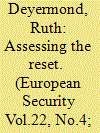

|
|
|
|
|
| Publication |
2013.
|
| Summary/Abstract |
Critics of the Obama administration's 'reset' with Russia claim that it has failed to improve bilateral relations and has conceded too much to Russia at the expense of American interests. In fact, the reset has delivered significant improvements in key areas and established the institutional basis for continued cooperation in the future, benefiting both states. Although disagreements remain on several important issues including missile defence, humanitarian intervention, and democracy, the reset has been broadly successful on its own terms, which were always limited in scope and based on a pragmatic recognition of the limits of possible cooperation. Future progress is uncertain, however - obstacles include differences of national interest; the complicating effects of relations with third party states and the impact of domestic politics. A continuation of the pragmatic approach underpinning the reset represents the best chance for stability in the US-Russia relationship.
|
|
|
|
|
|
|
|
|
|
|
|
|
|
|
|
|
|
|
|
|